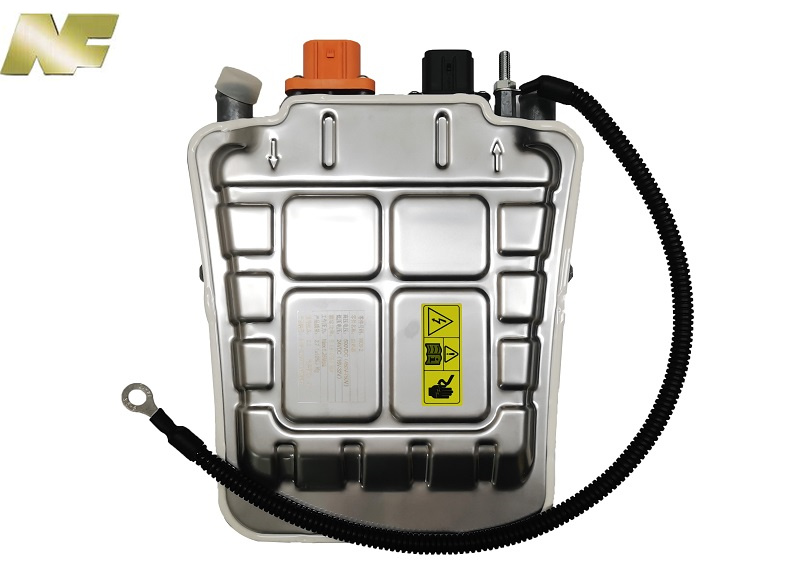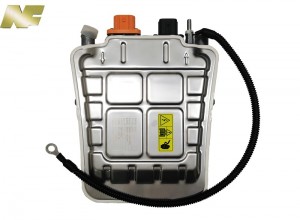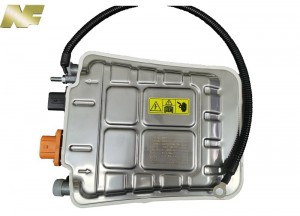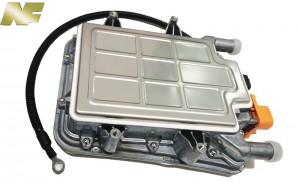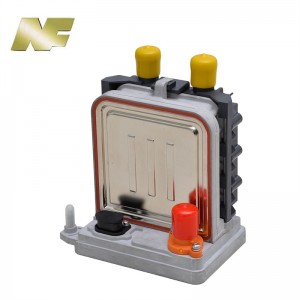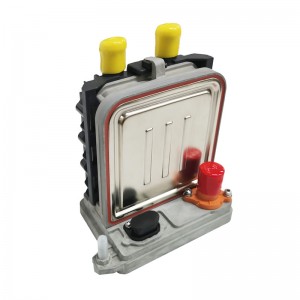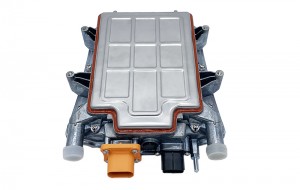NF 7kw High Voltage Coolant Heater 650V HVCH 12V PTC Coolant Heater
Technical Parameter
| Item | W09-1 | W09-2 |
| Heating output | 7kw, 8kw @10L/min,T_in=60℃ | |
| Rated voltage(VDC) | 350V | 600V |
| Working voltage(VDC) | 250-450 | 450-750 |
| Impulse current(A) | ≤40@450V | ≤25@750V |
| Controller low voltage(VDC) | 9-16 or 16-32 | 9-16 or 16-32 |
| Control signal | CAN2.0B、LIN2.1 | CAN2.0B、LIN2.1 |
| Control model | Gear (5th gear) or PWM | Gear (5th gear) or PWM |
| Heater dimension | 258.6*200*56mm | |
| Heater weight | <2.7kg | |
| High voltage connector in heater | Amphenol HVC2P28MV104 | |
| High voltage connector in car | Amphenol HVC2P28FS104 | |
| Low voltage connectors | 320Q60A1-LVC-4 (Haichen A02-ECC), & Sumitomo 6189-1083 | |
Product Size
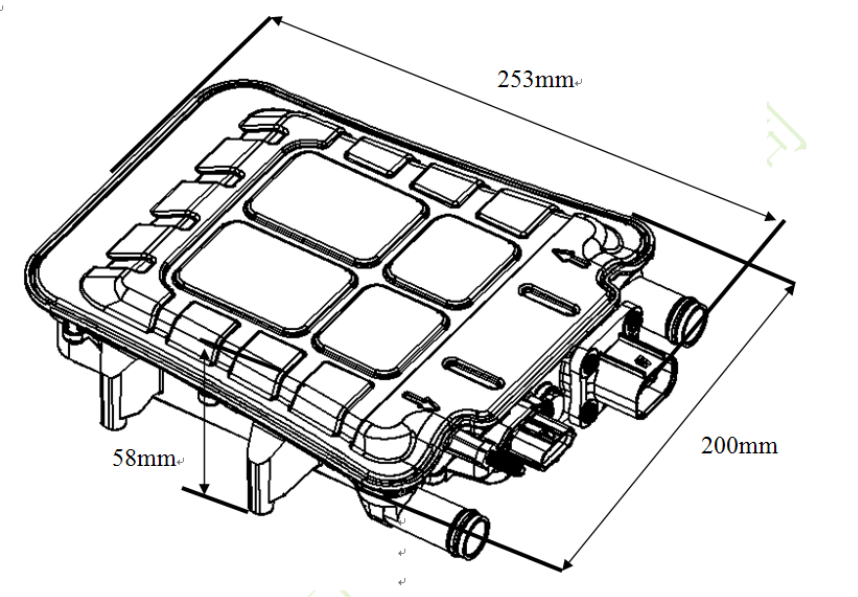
Description
As demand for electric vehicles (EVs) continues to grow, automakers are constantly striving to improve their efficiency and performance. One of the key components in the electric vehicle industry that requires special attention is the high-voltage battery heater. This blog will explore the role and evolution of high voltage battery heaters, with a particular focus on PTC coolant heaters and PTC electric heaters in automotive applications.
1. Understand high-voltage battery heaters:
High-voltage battery heaters are critical to maintaining optimal performance and extending the service life of electric vehicle batteries. The job of these heaters is to ensure that the battery operates within a specific temperature range to maximize its efficiency. When temperatures drop, batteries become less efficient, resulting in reduced driving range and power output. Therefore, a reliable high-voltage battery heater is essential to ensure optimal performance in cold weather conditions.
2. PTC coolant heater:
PTC (positive temperature coefficient) coolant heaters have become the first choice for high-voltage battery heating in automotive applications. These heaters have self-regulating properties, which means that as the temperature increases, the resistance of the PTC material increases, limiting the power supplied to the heater. Therefore, PTC coolant heaters are very energy efficient and help maintain a stable temperature within the battery pack.
Additionally, PTC coolant heaters offer several advantages over traditional heating methods. They are lightweight and compact and can be seamlessly integrated into an electric vehicle's battery pack or cooling system. Their efficiency is further enhanced by their ability to provide rapid, even heating. Additionally, PTC coolant heaters provide reliable performance and longer life, making them a cost-effective solution for automakers.
3. PTC electric heater:
In addition to coolant heaters, PTC electric heaters are also popular in the automotive industry. These heaters utilize PTC heating elements to provide efficient and controlled heating. Unlike traditional heating elements, PTC electric heaters do not require a separate power source or additional wiring. They can be connected directly to the vehicle's high-voltage battery pack, making them a convenient and reliable option.
The advantage of a PTC electric heater is its ability to heat specific parts of an electric vehicle, such as the battery or charging cable, without affecting other parts. This targeted heating reduces energy consumption and ensures optimal performance. Additionally, PTC electric heaters are compact, durable and have built-in safety features, making them ideal for automotive applications.
4. The future of high voltage battery heaters:
As technology continues to advance, the automotive industry is witnessing exciting developments in high-voltage battery heaters. Engineers are exploring innovative solutions to improve the efficiency and performance of these heaters. One such development is the integration of intelligent control systems and sensors ensuring precise temperature regulation for maximum battery efficiency.
Additionally, researchers are working on using waste heat generated within electric vehicles to improve the energy efficiency of high-voltage battery heaters. By utilizing this waste heat, reliance on external energy sources can be significantly reduced, thereby increasing driving range and overall energy efficiency.
in conclusion:
The development of high-voltage battery heaters (especially PTC coolant heaters and PTC electric heaters) has made a significant contribution to the performance and efficiency of electric vehicles. These advanced heating solutions offer numerous benefits, including energy efficiency, rapid heating, targeted temperature control and durability. As electric vehicle technology continues to evolve, high-voltage battery heaters will play a vital role in ensuring optimal battery performance, range and overall customer satisfaction.
Detail
For information about price, 2D/3D drawings, instructions and other information, please contact us in time, thank you!
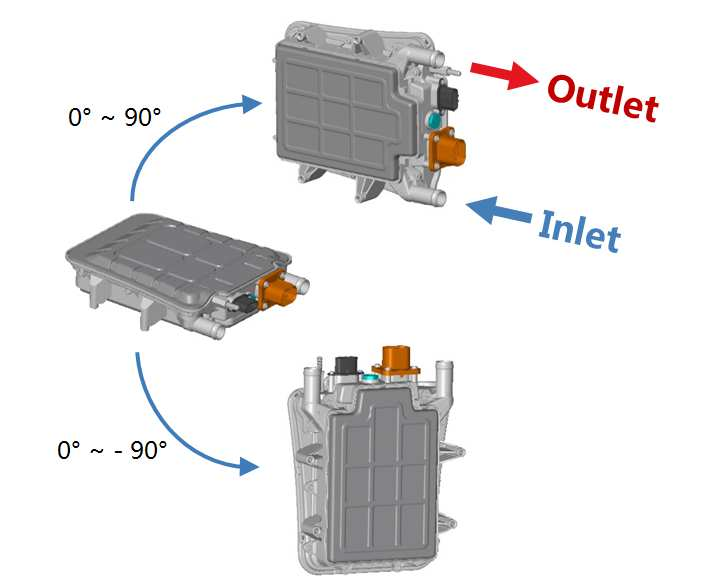
Application
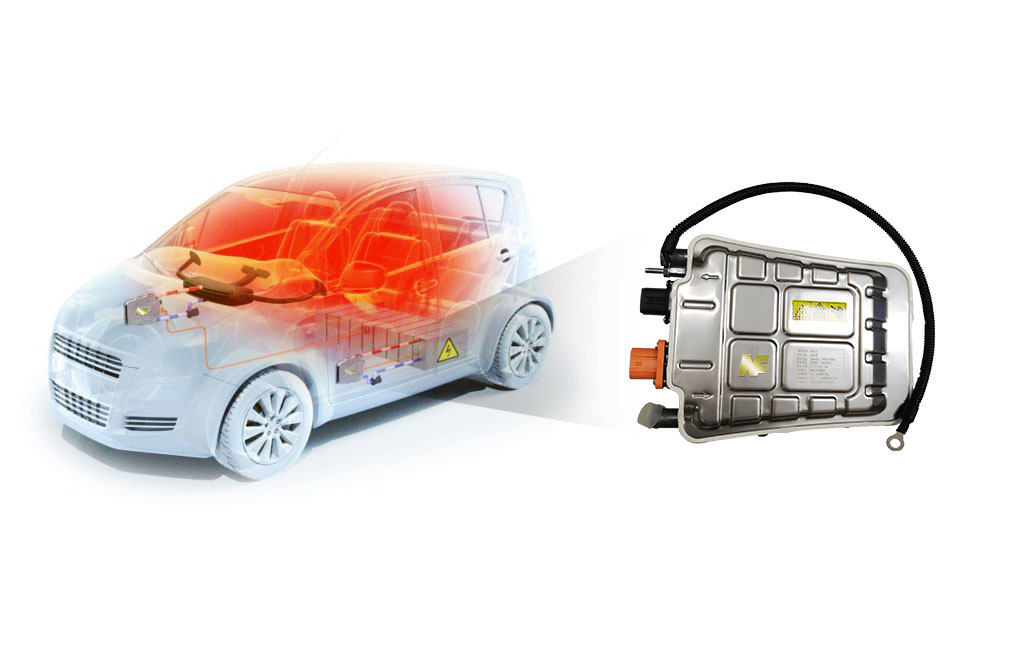

Application


Hebei Nanfeng Automobile Equipment (Group) Co., Ltd is a group company with 5 factories, that specially produce parking heaters, heater parts, air conditioner and electric vehicle parts for more than 30 years. We are the leading auto parts manufacturers in China.
Our factory's production units are equipped with high tech machineries, strict quality,control testing devices and a team of professional technicians and engineers endorsing the quality and authenticity of our products.
In 2006, our company has passed ISO/TS16949:2002 quality management system certification. We also bagged the CE certificate and Emark certificate making us among the only few companies in the world acquiring such high level certifications.
Currently being the largest stakeholders in China, we hold a domestic market share of 40% and then we export them around the globe particularly in Asia, Europe and Americas.
Meeting the standards and demands of our customers have always been our top priority. It always encourages our experts to continuously brain storm, innovate, design and manufacture new products, impeccably suitable for the Chinese market and our customers from every nook of the world.
FAQ
1. What is a Hv coolant heater?
A Hv coolant heater, also known as a heavy-duty coolant heater, is a device used to preheat the engine coolant in heavy-duty vehicles, such as trucks, buses, and construction equipment. It ensures the engine starts at optimal temperature, improves fuel efficiency, reduces emissions, and provides instant heat inside the vehicle.
2. How does a Hv coolant heater work?
A Hv coolant heater operates with an electric heating element that warms the engine coolant even when the vehicle is not running. The heater is connected to the vehicle's cooling system and uses electricity from an external power source to heat the coolant, which is then circulated through the engine via the radiator.
3. What are the benefits of using a Hv coolant heater?
Using a Hv coolant heater offers several advantages, including faster engine warm-up, reduced engine wear, improved cold-start performance, decreased idling time, increased fuel efficiency, better heating inside the vehicle, and lower emissions. It can also extend the lifespan of the battery and other engine components.
4. Are Hv coolant heaters compatible with all types of vehicles?
Hv coolant heaters are primarily designed for heavy-duty vehicles, such as trucks, buses, and construction equipment. However, there are also coolant heaters available for other types of vehicles, from cars to motorcycles, tailored to their specific requirements.
5. Can I install a Hv coolant heater myself?
While some individuals with technical expertise may be able to install a Hv coolant heater themselves, it is generally recommended to have a professional handle the installation. A skilled technician can ensure proper integration with the vehicle's cooling system and electrical connections, minimizing the risk of damage or malfunction.
6. Do Hv coolant heaters consume a lot of energy?
Hv coolant heaters are designed to operate efficiently and consume minimal energy. The actual energy usage varies depending on factors such as the heater's power rating, ambient temperatures, coolant volume, and the duration of preheating. In most cases, the energy cost is significantly lower compared to idling the engine for prolonged periods.
7. Is it safe to use a Hv coolant heater?
Hv coolant heaters are designed with safety features to prevent overheating, short circuits, and other potential issues. However, it is important to ensure the heater is installed correctly, following the manufacturer's instructions and local regulations. Regular maintenance and inspection are also recommended to ensure safe and reliable operation.
8. Can a Hv coolant heater be used in extreme weather conditions?
Yes, Hv coolant heaters are specifically designed to operate in extreme cold weather conditions. They are capable of preheating the engine coolant to provide reliable and quick starts, even in extremely low temperatures. This helps prevent issues such as engine freeze-up and ensures the vehicle remains operational.
9. Can a Hv coolant heater extend the engine's lifespan?
Yes, preheating the engine coolant with a Hv coolant heater can contribute to extending the engine's lifespan. By reducing wear caused by cold starts, the heater helps protect critical engine components and promotes proper lubrication, resulting in less strain on the engine over time.
10. Are Hv coolant heaters environmentally friendly?
Yes, Hv coolant heaters promote environmental friendliness in multiple ways. By reducing fuel consumption and emissions, they contribute to lower pollution levels. Additionally, by minimizing engine wear and extending the engine's lifespan, they reduce the need for premature vehicle replacements, thus reducing overall environmental impact.

